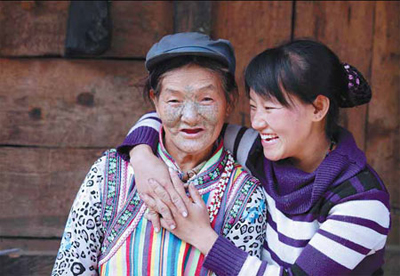
Li Wenshi, 73, one of the few remaining Derung women with facial tattoos, shares an amusing moment with her daughter Li Yuhua at their home in Yunnan province. Wang Jing / China Daily
Modernity slowly approaches the isolated Derung ethnic group, Hu Yongqi and Li Yingqing report from Nujiang, Yunnan province.
Editor's note: This is the fifth in a regular series of reports brought together under the banner "Lost Horizons", which aims to show life in the less-reported areas of the country and to give a voice to those whose words often go unheard. Slideshows and video footage are also available at www.chinadaily.com.cn/video
As dusk fell in Xiongdang village, deep in the shade of the Gaoligong Mountains in northwest Yunnan province, Li Songying's relatives and friends gathered around a fire pit fenced with bricks to protect the small, wooden house. The slices of pickled pork suspended above the flames swayed in the warm air and a chicken boiled slowly in a pot of rice wine, diffusing an appetizing smell.
Welcome to a party of the Derung ethnic group. After serving cooked taro and corn, Li Songying, 48, joined the fun and games. Losers in one game, where players attempt to correctly guess the number of fingers their opponent will hold up, have to perform a "forfeit" by quaffing a cup of the lethal "chicken soup".
The party ended at midnight, when the wine jars were finally empty, and the guests lay down to sleep on a piece of plastic sheeting next to the fire.
Next morning, as the first sunlight hit the village, the three hills hugging the contours of the Dulong River - rolling along like a blue ribbon unfolding in a stream of blue and white bubbles - resembled a beautiful landscape painting.
Xiongdang, deep in the hills that straddle the border with Myanmar, is the most isolated settlement in Dulongjiang township, located at the far end of the road that links the two. Even in good weather when the road is free from landslides in the rainy season, it takes three days to travel by bus from the provincial capital Kunming to the Gongshan Derung and Nu autonomous county and a further seven hours by car to the township.
Residents of Xianghong village, which has no road, face a seven-day trek if they need to visit the township government.
From November to June, the road is regularly rendered impassable by snow, which can lay 10 meters deep. Infrequent interaction with the outside world has sheltered the area from modernity, but it has also condemned the residents to a life of economic disadvantage.
The ethnic group was historically known as the Qiu people, but was renamed by former Premier Zhou Enlai in 1954 to Derung, meaning "single dragon" in Chinese.
Roughly 60 percent of the Derung live along Dulong River. Once they were famous throughout China for the facial tattoos sported by the womenfolk, but the practice is fast disappearing.
Li Wenshi, 73, and Lian Zixian, 74, both have facial tattoos, but the seven other girls tattooed alongside them as teenagers have passed away.
"The girls were bound with rope and the mother would hold her daughter's face still," explained Li Wenshi. "The tattooist scratched the design into their flesh with a sharp, red-hot chisel and then filled in the scars with ink made of soot from the bottom of cooking pots. The bloody scars took a week to heal and the girls' faces were swollen for at least five days."
The practice was forbidden during the "cultural revolution" (1966-76) and has never restarted, leaving those still bearing the tattoos as living historical relics.
The Derung people were too weak militarily to resist invasion from, among others, slave drivers from Tibet. According to the most widely accepted account, this resulted in the elders deciding to make the girls "ugly", and thus undesirable to invaders, by tattooing their faces. The tradition stuck and the indelible markings came to represent courage and became a prerequisite for marriage.
Only 34 tattooed women are left in the township, according to records at the Dulongjiang Frontier Police Station, and the youngest is 56. Two or three die every year, meaning that within a decade all trace of the practice could be gone. A series of photographs, taken when the local police station compiled health dossiers on the women, will be the only reminder of the tattoos that were once commonplace in the area.
Two decades of change
Traditionally, the Derung did not use money, but believed in absolute equality, even sharing the meat from the pigs that were only slaughtered for New Year celebrations, said Li Heng, a researcher at the Kunming Institute of Botany with the Chinese Academy of Sciences, who conducted an eight-month survey of Dulong River in the 1990s.
During the course of her research, Li discovered that standards of personal hygiene were poor. The locals had no idea how to build toilets and usually "did their business" behind their little wooden houses or just found a private spot. Rainfall provided a natural shower and the locals simply got clean as they walked through the frequent downpours.
The people didn't wash their faces or brush their teeth. Until recently, hot showers were unknown, except for those who were friends with the teacher at the local primary school. In some villages, family members shared one garment and anyone heading into the local township was automatically guaranteed its use, Li said.
In Xiongdang, Kong Zhijue, 22, has made his living by collecting medicinal herbs since he graduated from middle school. The low level of rainfall between June to October provides the best conditions, and Kong can spend as long as five days and nights combing the mountains, carrying only a cooking pot, some rice, a sheet of plastic and spare clothes.
Kong and his fellow collectors tie the bottoms of their trouser legs to prevent irritation from lice and leeches. "The heads of some lice will stay in your flesh after they bite you," said Kong, "Then that part of your body gets inflamed and the bugs have to be cut out of your flesh."
If he gets separated from friends in the thick jungles, he cuts characters into the tree trunks. Anyone coming across the tree responds with a message: "Your friend didn't show up" or "He is back home now".
As most villages gained access to roads, motorcycles became popular. Kong would have to save for more than two years to buy such a luxury, even though the price of the herbs he collects has soared to 500 yuan ($80) per kg, double that of 10 years ago.
Taking care of their 400-sq-m plot of land means that few parents have time to look after their children and so a system has developed whereby an older child from a different family is "borrowed" to act as a babysitter. Even though the local government now allocates 180 kg of rice to each resident annually, the tradition remains.
In contrast with the sobs heard at most funerals, the Derung people laugh instead. They believe that death is natural and therefore there is no point in being sad when it occurs. When one Xiongdang resident died several months ago, his still-clothed body was simply left to decompose close to the banks of the river. No one would tell me his name.
Traditionally, theft is unknown in the area and few mountain residents bother to lock their doors when they leave the house to scout for herb or work in the fields.
Mobile telephony was introduced to the area in 2004. The limited signal capacity means that only 15 people can make calls simultaneously and the service is patchy. Di Yanfang, 19, said she has to walk 4 km from her house in Maku village to find a signal. "Usually I don't use my cellphone too much, but at least it's a sign of progress," she said. The Internet was only connected in September this year.
Hydroelectric generators have provided the region with power since the 1990s, but the supply is unstable and won't sustain television sets. Ma Haoguo, a 51-year-old resident of Qinlandang village, said he hadn't watched TV for 20 years. "How is leader Deng Xiaoping?" he inquired. "Is he in good health?"
When I explained that Deng passed away in 1997, Ma looked surprised.
'Awkward workers'
In Maku village, the men traditionally used crossbows to shoot animals, such as the flying squirrels that glide between the trees, but recently the locals have become less reliant on local wildlife for food.
Retired soldier, Mu Jiansheng, raises Derung cattle, famous for their high nutritional value. The animals are left alone in the wild for most of the year, except winter, with a few cakes of salt provided once a month. The township currently has 692 wild cattle, with each animal worth 8,000 to 10,000 yuan. Lacking funds to buy calves, Ma intends to raise his own cattle.
A lack of knowledge about crop planting and cultivation techniques meant that the Derung people don't eat vegetables during the winter. Li Fazheng, manager of Xingda Food Co in Gongshan, spotted a gap in the market and erected 18 greenhouses in Kongdang village, the site of the township government, and plans to teach the locals how to grow and care for crops.
However, most of the 16 locals Li Fazheng employed were, in his words, "awkward workers". He complained that they killed the seedlings by watering the leaves instead of the roots and when they painted a wall, they used their hands instead of brushes, ending up "covered in paint, like lacquer men".
"Dulong River needs more help from the government," said researcher Li Heng. "A better level of education would help the people expand their horizons."
An increasing number of young people are receiving some education, even though they have to traverse the mountains to attend the middle school in the county seat. Education has been a mixed blessing, though. The glimpses of the outside world have resulted in a number of younger villagers refusing to return home, according Li Yuhua, 24.
When Zhao Liming, a professor of Chinese at Tsinghua University in Beijing, wanted to conduct research into the famous facial tattoos in 2008, she hired Chen Yonghua, the village head of Xiongdang, as her guide.
Chen's younger brother graduated from a college in Kunming, but had not been seen in the village for two years. His absence weighed heavily on his mother, who questioned visitors and asked if they had seen her son.
Zhao promised to help. She uploaded a video of Chen's mother on the Internet and the missing son was located and reunited with his family less than a month afterward.
"As the local economy expands, the Derung are caught between tradition and modernity. It will take a long time for them to adapt to modern production methods and a non-traditional lifestyle," said Li Heng.
Contact the reporters at huyongqi@chinadaily.com.cn and liyingqing@chinadaily.com.cn
Guo Anfei and Xie Yong contributed to this story.
(Source: China Daily, http://www.chinadaily.com.cn/cndy/2012-11/28/content_15964930.htm)




